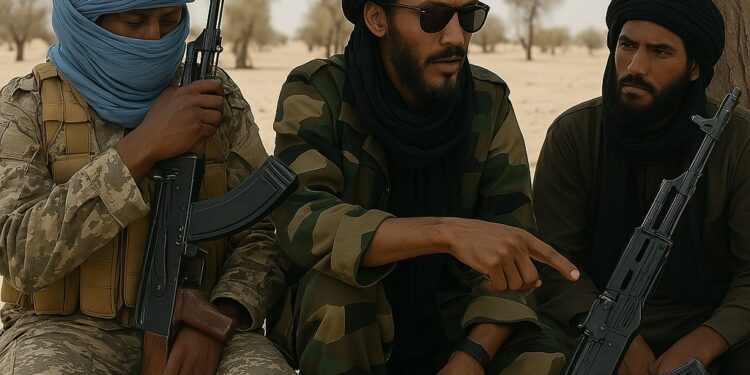Mali’s Silent Resistance: A Nation’s Battle Against the Wagner Group
By Pencil Pushers Editorial Team
In the sun-scorched northern region of Mali, a silent storm is brewing. This isn’t a storm of sand and fury, but a simmering struggle for identity, sovereignty, and survival. Since 2023, Mali has entered a new chapter in its long history of conflict, facing not only insurgent threats but also the encroaching shadow of the Wagner Group.
The Wagner Group’s Growing Influence in Mali
The Wagner Group, a notorious Russian paramilitary organization known for its activities in Ukraine, Syria, and the Central African Republic, has established a significant presence within Mali’s security framework. Officially invited by the transitional Malian government to combat jihadist insurgencies, Wagner’s involvement has raised alarms among civilians and international observers.
What began as a strategic collaboration has turned ominous. Reports of extrajudicial killings, forced disappearances, and intimidation tactics have become alarmingly common. Villages that once navigated conflicts between jihadist factions now find themselves ensnared in a dual conflict—one driven by ideology, the other by foreign military might.
The Unseen Struggles on Forgotten Frontlines
In the northern regions of Gao, Kidal, and Timbuktu, the scars of past rebellions are stark. Here, Tuareg and Arab communities have long sought autonomy, confronting government crackdowns and unfulfilled promises. The arrival of the Wagner Group has brought these old wounds back to the surface.
Local resistance groups, remnants of the 2012 rebellion, are reorganizing—not for independence, but to protect their communities from what they perceive as a new occupation. Despite limited resources and weaponry, their determination remains resolute.
“We are not fighting Russia,” declares a masked fighter from a makeshift camp. “We are fighting for our dignity.”
Voices from the Shadows: Life Under Wagner
Interviews with villagers and resistance members reveal a haunting pattern: entire communities are displaced, once-bustling markets lie silent, and fear dominates daily life.
A teacher from Menaka recalls the arrival of Wagner forces, stating, “They came with the army, but they did not speak our language. They did not ask questions. They just took what they wanted.” Others recount harrowing stories of night raids and unexplained disappearances. These personal testimonies, though challenging to verify, consistently indicate that Wagner is not in Mali to protect its people.
Geopolitical Shifts: Mali’s New Alliances
Mali’s shift toward Russia, distancing itself from traditional allies like France and the United Nations, has transformed the region’s geopolitical landscape. The withdrawal of French troops in 2022 created a vacuum that Wagner eagerly filled. For the Malian junta, this partnership provides immediate military strength and political leverage, but at a steep price.
International human rights organizations have raised concerns, yet the Malian government remains defiant. “We are a sovereign nation,” states a spokesperson. “We choose our partners.” However, sovereignty in this context often resembles a double-edged sword, as the government consolidates power in Bamako while the rural areas suffer.
A New Wave of Resistance
What distinguishes this resistance from past movements is its moral clarity. Driven not by ideology, but by the fundamental desire for peace, these fighters aim not to overthrow the state but to survive its pressures.
In a hidden radio station nestled in the hills, a young woman broadcasts nightly messages of hope and defiance. Her voice, though soft, resonates powerfully: “We are still here. We will not disappear.” This underground communication network has become crucial for the resistance, disseminating news, aid, and a reminder that northern Mali is more than a conflict zone—it’s home.
The Role of Witnesses: Documenting the Crisis
Journalists and filmmakers, often at significant risk, are capturing the realities of this crisis. Their footage reveals stark contrasts: Wagner convoys traversing ghost towns, children playing amid crumbling schools, elders praying beneath bullet-riddled walls. These images serve not only as documentation but as acts of resistance, affirming that in silence, complicity can thrive.
What Lies Ahead for Mali
Mali’s future teeters on a precarious edge. The transitional government has promised elections, yet timelines remain fluid, shifting like desert sands. As Wagner’s grip tightens, resistance movements are gaining courage.
There are no straightforward solutions; past foreign interventions have faltered, and internal reforms progress slowly. Yet one truth remains undeniable: the people of Mali are far from passive victims; they are the architects of their destiny.
Their struggle may evade global headlines, and their names may fade into obscurity. But within the quiet resistance of a mother hiding her son from conscription, the whispered prayers of a displaced elder, and the coded broadcasts of a rebel DJ, a deep-rooted revolution is unfolding—not of guns and flags, but of unyielding spirit.














































